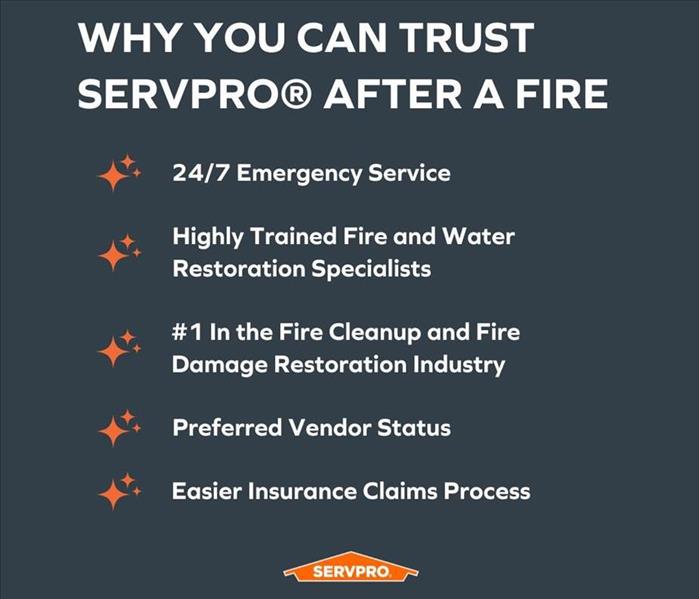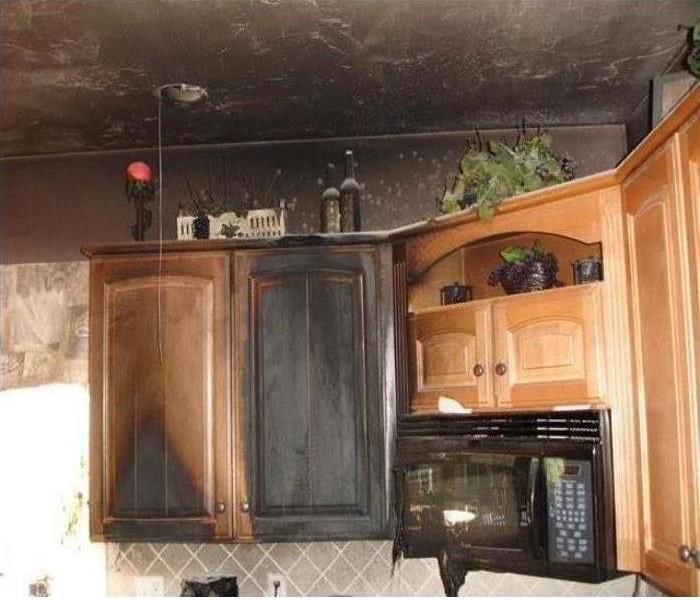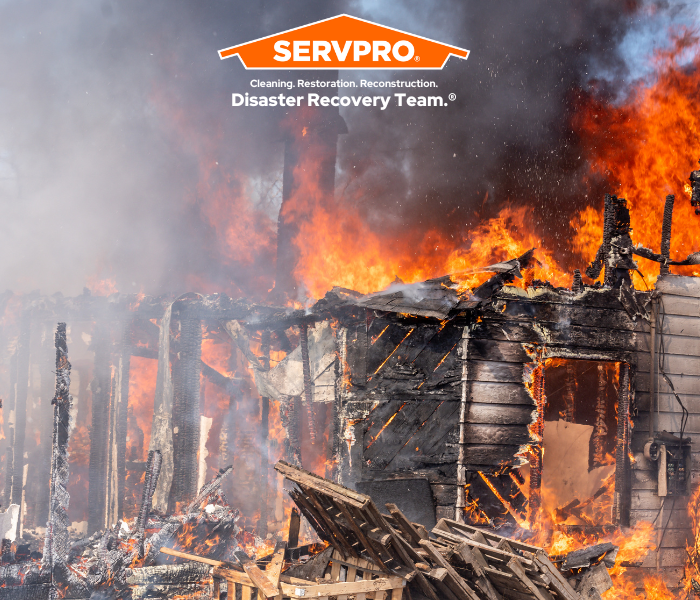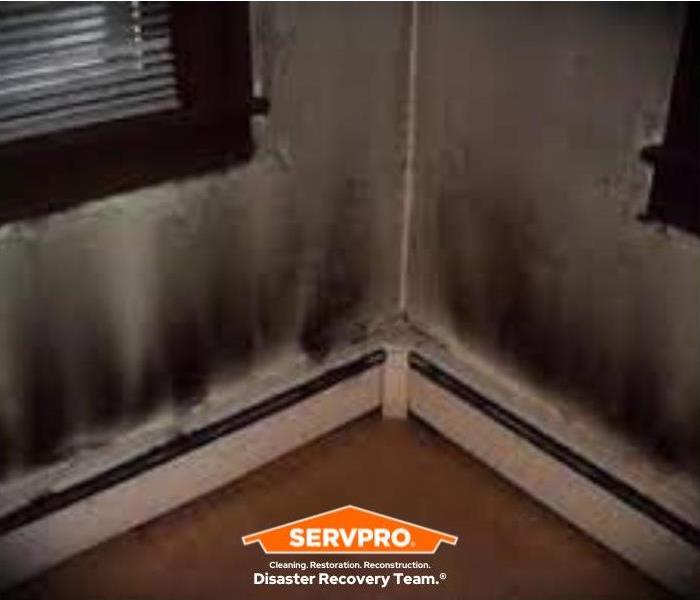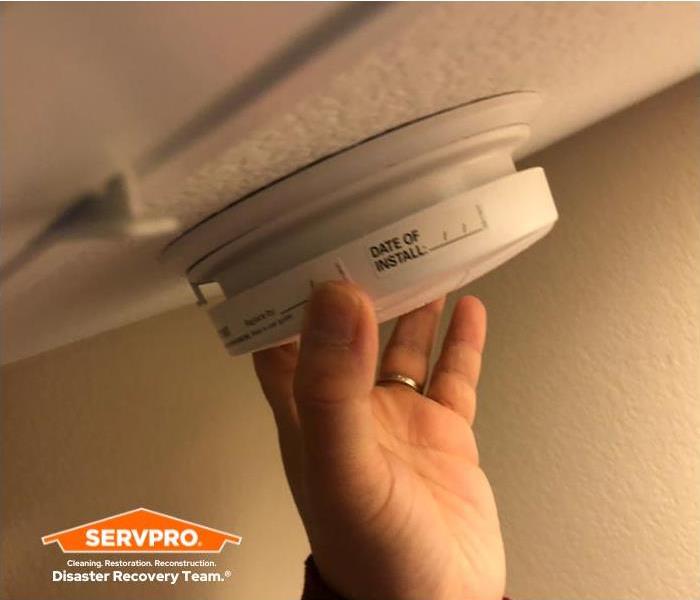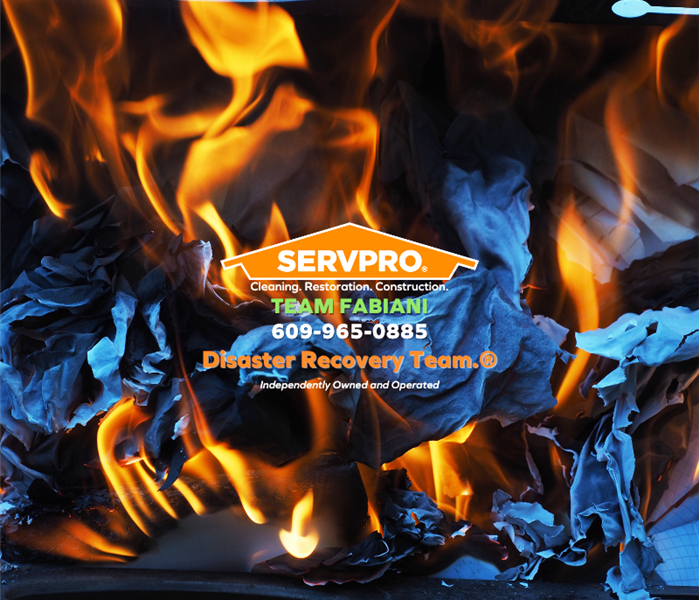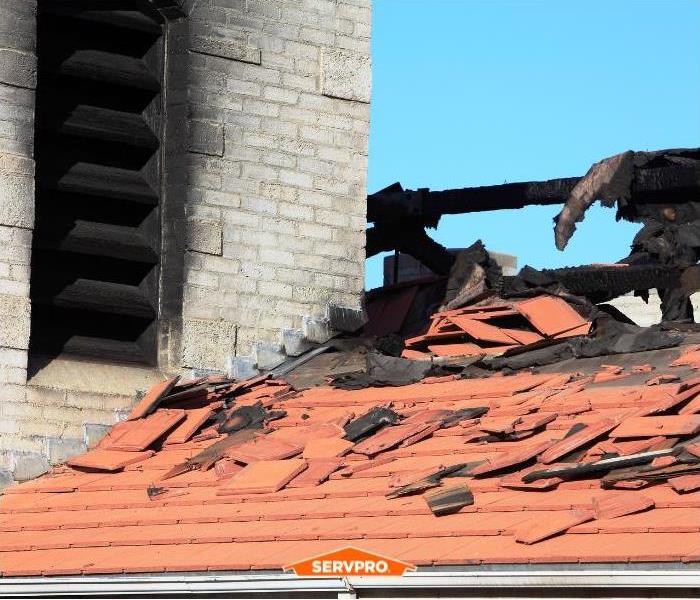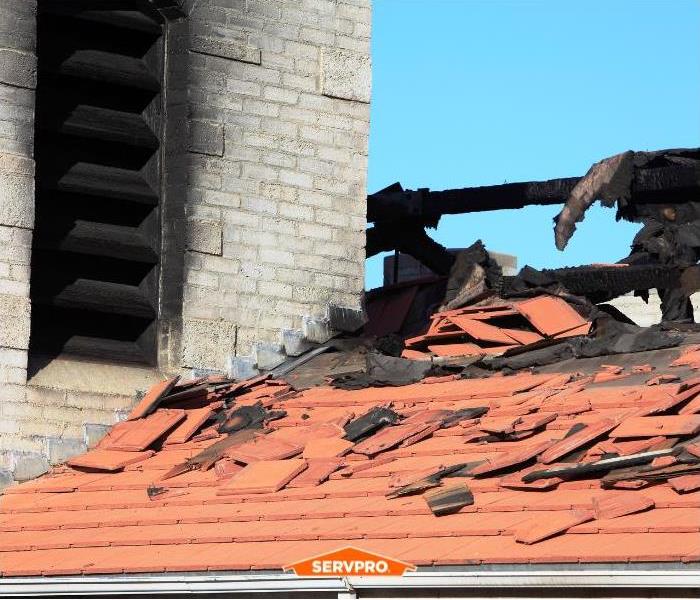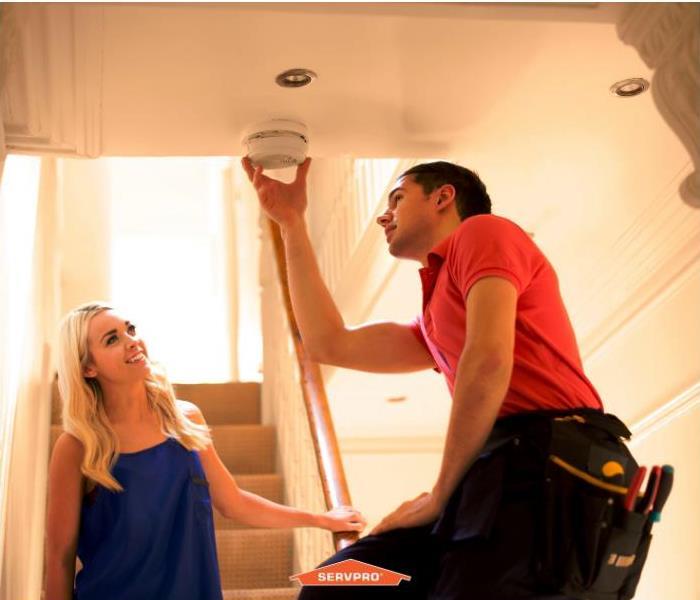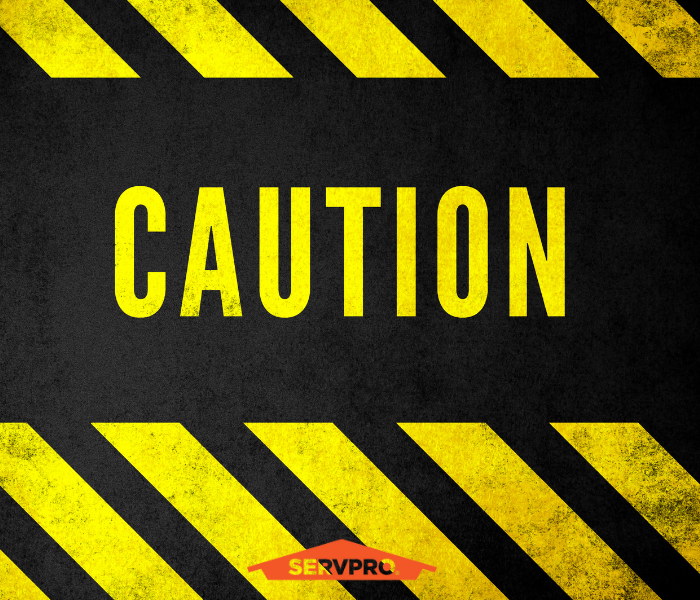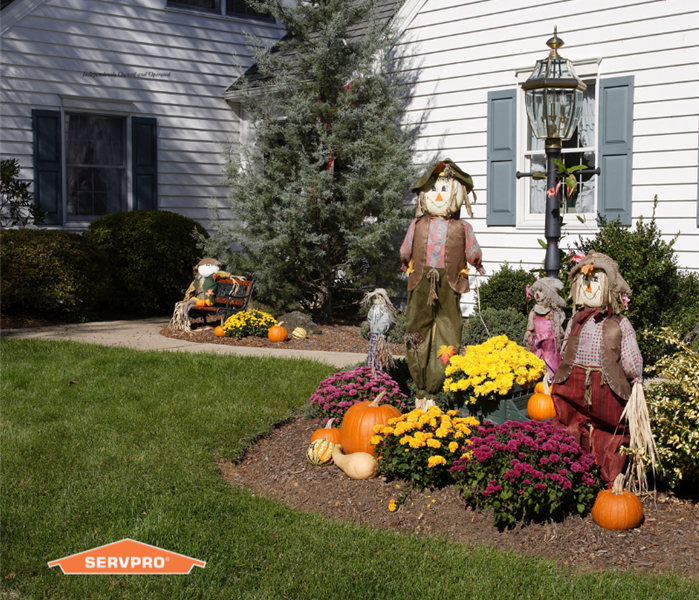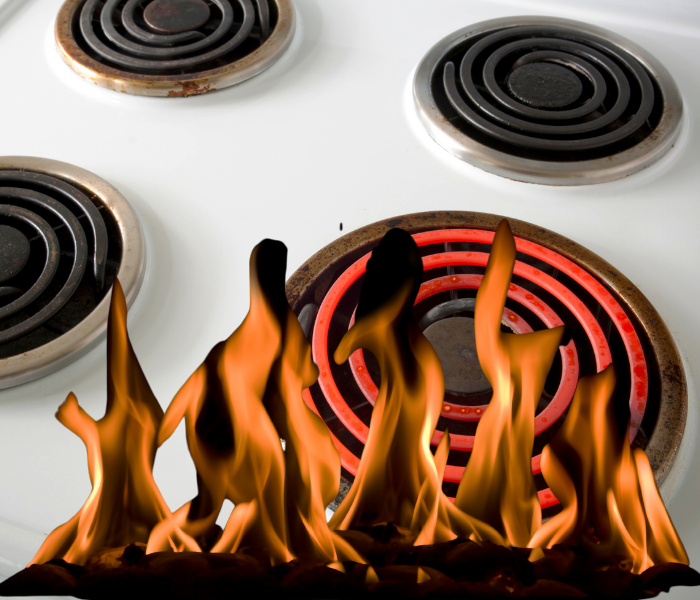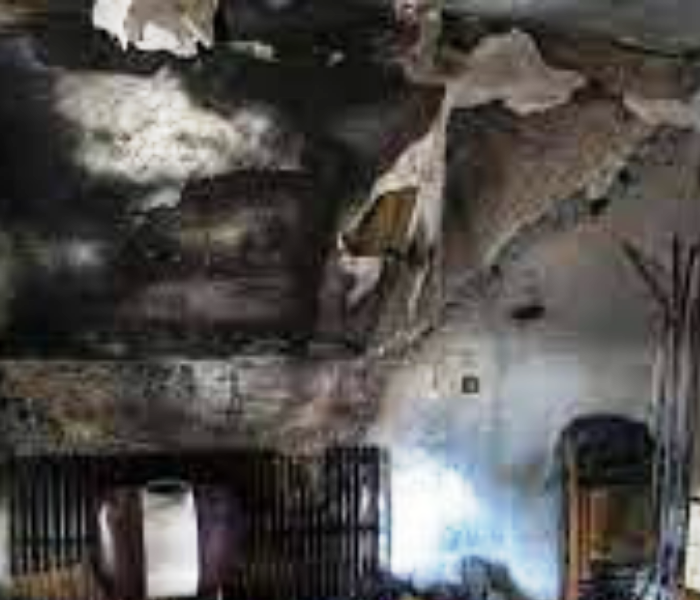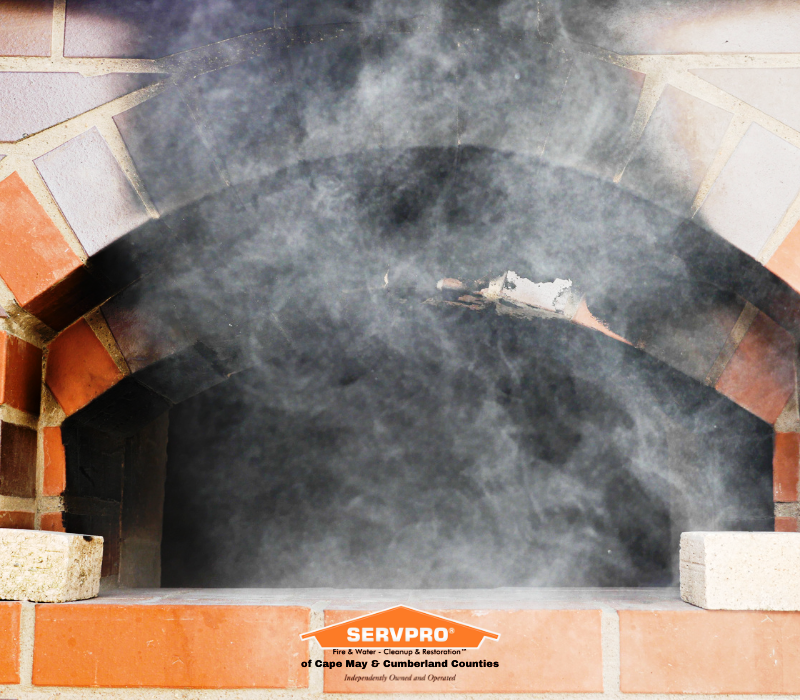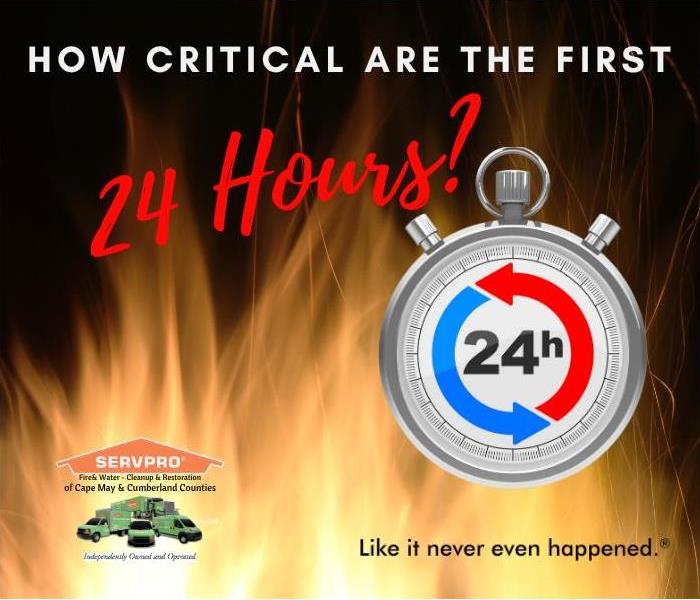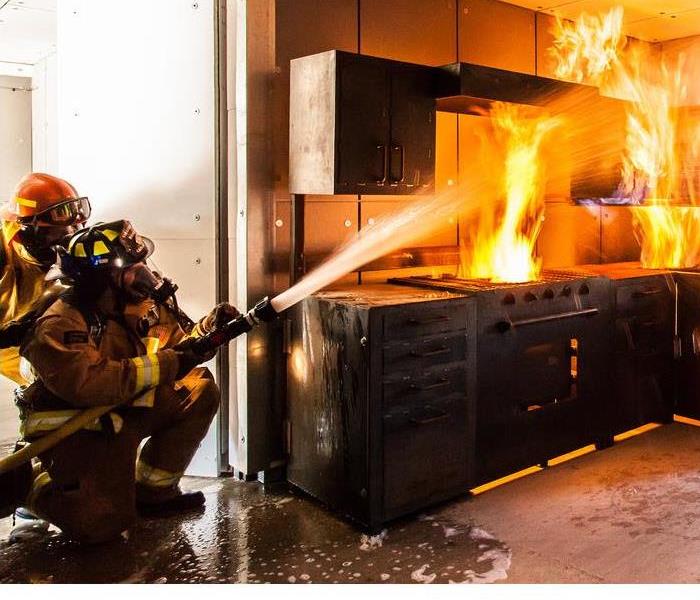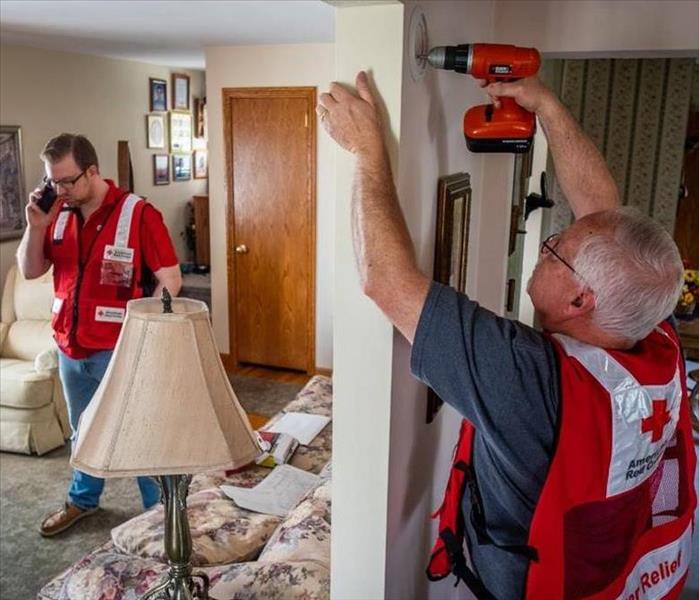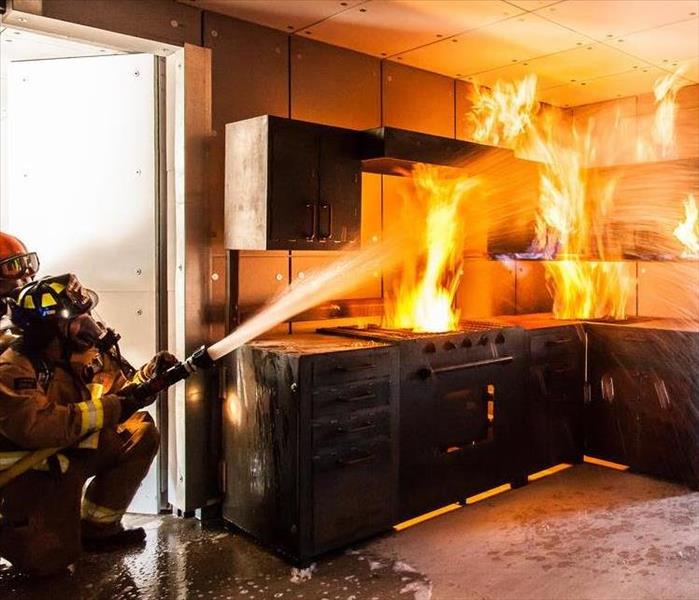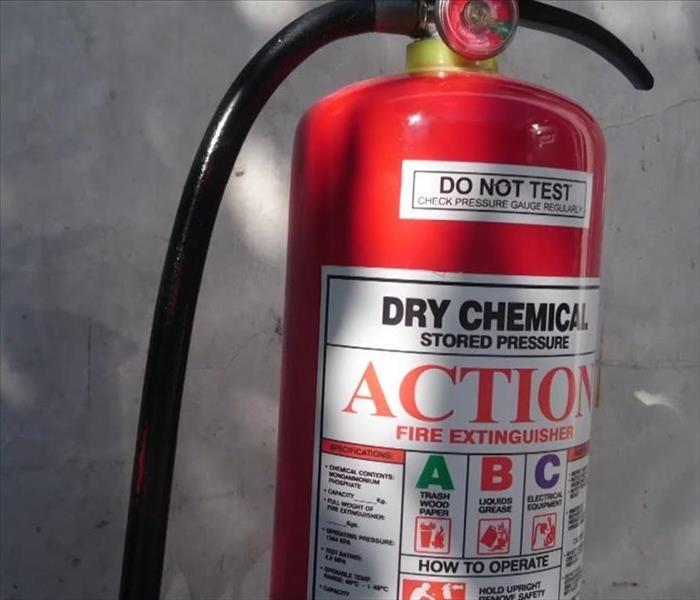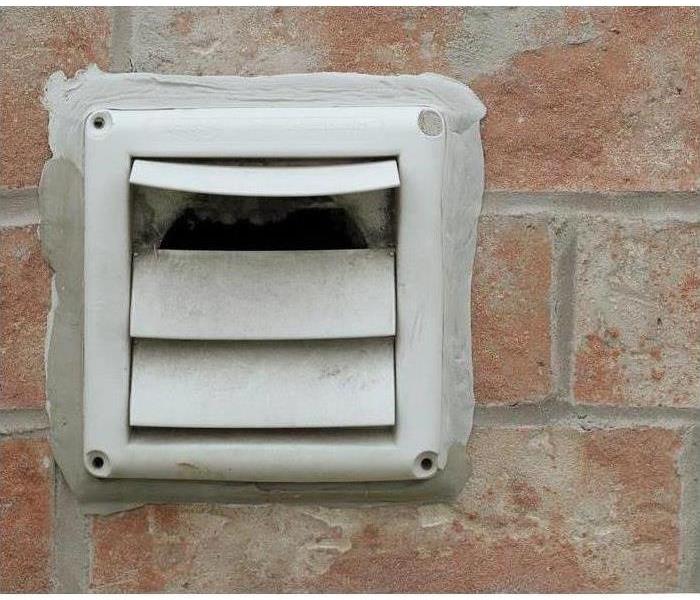Archived Fire Damage Blog Posts
Team Fabiani Provides Professional Fire Damage Restoration Services
2/25/2025 (Permalink)
Should You Take on Fire Clean-up Yourself?
Fire damage is serious and dangerous for a variety of reasons. Fire damage restoration services should be done by trained professionals, with the proper training and equipment. The clean-up may seem like something you could take on yourself, but it should be done by an expert. Trust a name that is backed by fifty years of residential and commercial experience, SERVPRO®.
The Fire is Out, Now What?
After determining the property is safe to enter, the first issue is removing the water after firefighting efforts. Team Fabiani’s trained technicians will assess the damage caused by the fire, and handle the cleanup and fire damage restoration. This includes deep-cleaning your home or business, including soot removal from walls, carpets, and upholstery. Professional restoration experience is especially important when it comes to smoke damage cleanup and the removal of the smoke odors. Before trying to do this work on your own, remember smoke and soot can be toxic. This is a job for trained, certified experts, equipped with advanced technology. SERVPRO teams have the knowledge and state-of-the-art equipment to make sure your project is completed correctly. Completing the project includes cleaning up the fire damage and removing the smell of smoke. Quick response from SERVPRO can save you time and money in the long run. Team Fabiani will take care of your home or business and make sure all fire damage and smoke damage is removed, we will completely restore your property.
Why You Can Trust SERVPRO of Cumberland County After a Fire
3/15/2023 (Permalink)
Why You Can Trust SERVPRO of Cumberland County After A Fire
Our professionals are highly-trained, with the experience, tools, and knowledge to clean up fire damage and remove the smell of smoke.
In keeping with our goal to restore your property and cherished possessions to their pre-fire condition, we use appropriate personal protective measures to safely clean, deodorize and restore your property.
Every fire damage event is a little different, and requires a unique solution, but the general process stays the same. The steps listed below illustrate our process for the “typical” fire damage emergency.
Step 1: Emergency Contact
The restoration process begins when you give us a call. Our specialist will ask a series of questions regarding the fire damage event that will help us arrive quickly with the appropriate equipment and resources.
Step 2: Inspection and Fire Damage Assessment
We will carefully inspect and test adjoining rooms of your property to determine the extent of the fire, smoke, and soot damage. This step is crucial to developing a plan of action.
Step 3: Immediate Board-Up and Roof-Tarp Service
Fire damage can often compromise windows, walls, and roofs. To maintain security and to protect against further damage, SERVPRO can board up missing windows and walls and place tarps on damaged roofs.
Step 4: Water Removal and Drying (if water damage is present)
The water removal process begins almost immediately and removes the majority of the water. We will then use dehumidifiers and air movers to remove the remaining water and complete the drying process.
Step 5: Removal of Smoke and Soot from All Surfaces
SERVPRO uses specialized equipment and techniques to remove smoke and soot from ceilings, walls, and other surfaces.
Step 6: Cleaning and Sanitizing
We will clean all of the restorable items and structures that were damaged by the fire. We use a variety of cleaning techniques to restore your belongings to pre-fire condition. We’re also trained to remove odors using industrial air scrubbers and fogging equipment.
Step 7: Restoration
Restoration is the final step—getting your home or business to its pre-fire condition. Restoration may involve minor repairs, such as replacing drywall, painting, and installing new carpet; or it may entail major repairs such as the reconstruction of various areas or rooms in a home or business.
We're Here to Help® 24/7/365. Call 609-965-0885.
What To Do: Smoke and Soot Cleanup
9/23/2022 (Permalink)
Smoke and Soot in Your Cape May or Cumberland County Property?
Smoke and soot is very invasive and can penetrate various cavities within your home or business, causing hidden damage and odor.
Our smoke damage expertise and experience allows us to inspect and accurately assess the extent of the damage to develop a comprehensive plan of action.
Smoke and Soot Facts:
- Hot smoke migrates to cooler areas and upper levels of a structure.
- Smoke flows around plumbing systems, seeping through the holes used by pipes to go from floor to floor.
- The type of smoke may greatly affect the restoration process.
Different Types of Smoke:
There are two different types of smoke–wet and dry. As a result, there are different types of soot residue after a fire. Before restoration begins, SERVPRO® of Cape May & Cumberland Counties will test the soot to determine which type of smoke damage occurred. The cleaning procedures will then be based on the information identified during pretesting.
Additional information:
Wet Smoke – Plastic and Rubber
- Low heat, smoldering, pungent odor, sticky, smeary. Smoke webs are more difficult to clean.
- Dry Smoke – Paper and Wood
- Fast burning, high temperatures, heat rises therefore smoke rises.
- Protein Fire Residue – Produced by evaporation of material rather than from a fire
- Virtually invisible, discolors paints and varnishes, extreme pungent odor.
Our Fire Damage Restoration Services
Since each smoke and fire damage situation is a little different, each one requires a unique solution tailored for the specific conditions. We have the equipment, expertise, and experience to restore your fire and smoke damage. We will also treat you with empathy and respect and treat your property with care.
Have Questions about Fire, Smoke, or Soot Damage? Call a Franchise Professional Today – 609-624-0202.
We serve Cape May, Ocean City, Wildwood and surrounding towns in Cape May County; as well as Vineland, Millville and Bridgeton and surrounding towns in Cumberland County.
What Can Turn Into a House Fire?
9/23/2022 (Permalink)
Tis the Season in Ocean City and Cape May County!
According to the National Fire Protection Association (NFPA), fire departments in the United States responded to a house fire every 86 seconds. Given this risk, it’s critical for homeowners to pinpoint potential triggers and take action to prevent fire damage.
As you review your home safety, here are a few common causes of house fires you should stay aware of.
What Can Turn Into a House Fire?
- Portable Heaters
When winter strikes, a portable heater may provide the little bit of extra warmth you need to stay comfortable. However, these devices can get extremely hot and ignite surrounding objects — such as curtains and furniture. If you must use a portable heater, never leave it unattended and make sure it’s not near any flammable items.
- Kitchen Accidents
It takes a lot of heat to cook food, so danger can arise quickly if it’s not properly controlled. Gas stoves, grease, and food left in the oven for too long are all potential sources of fire damage. Minimize these risks by supervising meal preparation activities, keeping curious kids away from active stoves, and maintaining a clean kitchen space.
- Faulty Wires
Since electrical wires remain hidden behind walls, it can be hard to detect potential risks caused by factors like old age or pets that chew through cables. Call an electrician for an inspection at the first sign of trouble, such as flickering lights, malfunctioning outlets, and mysterious burning smells. A professional survey is also a good idea if your wiring is over 20 years old.
- Smoking
When dropped into the trash or left unattended, cigarettes can quickly spark massive flames, especially if everyone in the house is asleep. The best way to prevent this problem is to smoke outdoors — or quit.
- Candles
Open flames from candles can feel inviting and elegant, but they aren’t as contained as you might think. When flames get too big or candles are knocked over, they can trigger massive house fires. Always blow out lit candles before leaving a room or use battery-operated versions that do not use real flames.
Watching out for these risks can help prevent house fires, but there may be instances where the danger is simply out of your control. For these situations, turn to SERVPRO® of Cape May & Cumberland Counties for complete residential restoration services. Our trained experts use state-of-the-art tools to safely remove and restore fire damage. Call 609-624-0202 to request assistance - we're here to help 24/7.
Before You Turn The Heater On...
9/23/2022 (Permalink)
What is a Furnace Puff Back & How Should You Handle It?
If you use an oil furnace, it’s important to know about the risk of puff backs. Essentially, furnace puff backs occur when burners do not ignite on start-up, causing excess oil fumes to combust. This reaction produces a great deal of smoke that causes soot to spread throughout the house.
When this happens, SERVPRO® of Cape May & Cumberland Counties recommends acting fast to protect your health and your belongings from smoke damage. To help you stay prepared, we highlight a few do’s and don’ts to follow when you experience a furnace puff back:
DO:
Protect Your Belongings.
Soot can spread quickly, so you’ll need to act fast to keep it from setting on your belongings. If you have a forced air system, tape cheesecloth over the vents to help keep particles from coming through the ducts. You can also place towels over carpets, rugs, and upholstery to provide a protective barrier.
Review Your Homeowner’s Insurance Policy.
Since it takes special tools and experience to properly clean smoke damage, you’ll need to call a residential restoration service provider to clear your home of soot. But before you call, check your homeowner’s insurance policy, as most providers cover this kind of restoration.
Have Your Furnace Inspected.
Although puff backs can be one-off events, the problem may have occurred due to a mechanical issue with the equipment. To prevent further puff backs, have a heating specialist inspect and repair your furnace.
DON'T:
Touch or Breathe Soot.
Soot can be extremely hazardous to your health when inhaled, as it contains a variety of toxic components and carcinogens. Limit movement and keep individuals out of the home until the problem is resolved. As you protect your belongings, cover your mouth and nose with a face mask. Additionally, throw away any exposed food.
Try To Clean Surfaces.
While it’s fine to take steps to shield items from smoke damage, you shouldn’t try to clean surfaces. Standard cleaning supplies will not remove soot and may only cause particles to settle in further. Instead, wait for a professional smoke and fire damage restoration team to clean the area.
Increase Air Circulation.
You may be tempted to turn on a fan or open windows to eliminate smoke, but increased air circulation will only spread particles. To keep the problem contained, try to keep airflow to a minimum.
When furnace puff backs occur, SERVPRO of Cape May & Cumberland Counties offers fast, thorough, and affordable restoration services. Equipped with specialized cleaning products, our Franchise Professionals minimize smoke damage in your home and eliminate stubborn odors.
To request assistance, call 609-624-0202 to reach a Puff Back Specialist 24 hours a day, seven days a week.
We are proud to serve our local communities:
- Vineland, NJ
- Millville, NJ
- Bridgeton, NJ
- Lower Twp - Villas, NJ
- Ocean City, NJ
- Ocean View, NJ
- The Wildwoods, NJ
- Cape May Court House, NJ
- Marmora, NJ
- Cape May, NJ
- Rio Grande, NJ
- Woodbine, NJ
- Sea Isle City, NJ
- Port Norris, NJ
- Fairton, NJ
Prevent Fire Disasters!
9/23/2022 (Permalink)
Prevent Fire Disasters!
Keep your family safe with a working smoke alarm in every bedroom.
Did you know that roughly half of home fire deaths result from fires reported between 11 p.m. and 7 a.m., when most people are asleep?
Smoke alarms save lives. If there is a fire in your home, smoke spreads fast and you need smoke alarms to give you time to get out. In fact, having a working smoke alarm cuts the chances of dying in a reported fire in half!
When it comes to smoke alarms, it’s about “location, location, location.”
The key message from Fire Departments everywhere, is to install smoke alarms in every bedroom, outside each separate sleeping area, and on every level of your home, including the basement (if you have one). Larger homes may need more alarms.
The National Fire Protection Association (NFPA) shares this important information so everyone better understands the life-saving value of home smoke alarms. Visit NFPA's website for more information.
*The above information courtesy of the National Fire Prevention Association.
For information on what to do AFTER a fire call a SERVPRO Franchise Professional at 609-624-0202. We're here 24/7 every day of the year.
20 Bad Habits That Can Burn Down Your House!
7/26/2022 (Permalink)
House fires are more common than you may realize, with potential fire starters like light bulbs, laptops, and lint traps hiding in plain sight throughout your home, disguised as harmless, everyday necessities.
Are you guilty of one of these bad habits that could burn your house down? Read on to find out.
Piling Up Dirty Rags/Oil Soaked Rags
A wood stain can bestow the perfect finishing touch on a DIY furniture project. But later on, that pile of oil-soaked rags you tossed in the corner could trigger the perfect storm: Left unattended, those rags are a very real fire hazard, as they could oxidize and spontaneously combust, causing a house fire. To dispose of oily rags properly, place them in a metal can that's been filled with water, and cover it with a tight-fitting lid, or lay them flat outside to dry.
Misusing Electric Blankets/Electric Blanket Fire
A warm and cozy electric blanket is a welcome comfort in the cold of winter, but it also poses a potential fire hazard if used improperly. Never allow pets to snuggle up on top, and don't pile extra covers over the electric blanket, because excessive heat buildup may lead to fire. Keep your electric blanket at its lowest setting, never bend the coils, and always turn it off in the morning.
Neglecting Appliance Recalls
During the last decade, home appliances caused an estimated 150,000 fires each year, and a significant number of these were caused by defective appliances. To keep on top of recalls and prevent disaster in your home, register your appliance with the manufacturer or go to www.recalls.gov to find out if any of your models are on the list.
Lingering Dryer Lint/Lint Trap Fire Safety
We all know that emptying the lint screen increases your dryer’s efficiency, but did you know that lint is also flammable? Mixing excessive heat with lint buildup is a recipe for disaster. Clean the dryer vent and exhaust duct regularly, as well as the interior of the dryer frame, to clear away lint and clogs, and reduce the risk of fire.
Letting Your Laptop Overheat/Laptop Fires
If you own a laptop, you know how hot it can get. When you leave your computer on your bed, couch, rug, or other soft, flammable surface, you run the risk of restricting airflow through the cooling vents, which can cause your laptop to overheat and possibly catch fire. To prevent fires, keep your laptop on a desk or table instead.
Choosing the Wrong Wattage/Light Bulb Fire Safety
If you've ever thought to yourself, "It's probably OK to use this 60-watt bulb in a 40-watt socket," you're not alone. You are, however, putting your home at risk. Installing a light bulb with a wattage that is too high for a lamp or light fixture is a leading cause of electrical fires. Always check the light fixture’s maximum wattage, and never go over the recommended rating.
Using Too Many Extension Cords/Extension Cord Fire
Extension cords are meant to be a temporary response to a lack of electrical outlets, not a permanent solution. This is why: Connecting a large number of cords for a significant amount of time can cause an overload that leads to a short circuit—which could ignite a fire. If you need additional outlets, hire a qualified electrician to install them, and you'll avoid this problem altogether.
Performing DIYs You're Not Qualified to Do/Electrical Fires
Americans will spend about $200 billion this year fixing up their homes, and nearly a fifth of this expense will go toward DIY projects. But jobs involving electrical wiring, plumbing, and HVAC units should never be completed without a qualified professional, because gas leaks and electrical sparks resulting from improper installation are a common cause of house fires. Don't put your home and your family at risk by attempting these dangerous DIYs on your own—hire a licensed professional instead.
Disregarding Dust/Dust Fires
Believe it or not, built-up dust can be a fire hazard if it collects in and around electronics, electrical sockets, and even floor heaters. By vacuuming on a regular basis, especially behind your electronics, you’ll significantly reduce the likelihood that particles of dust will catch fire due to prolonged exposure to heat sources.
Storing Batteries Improperly/ Battery Fires
If you store 9-volt batteries in your kitchen junk drawer, you may be putting your home at risk. When loose batteries roll around with other metals, such as screws or paper clips, the two terminals could short out and generate enough heat to ignite nearby flammables. Put a piece of electrical tape over the terminals, or store the batteries in their original packaging to prevent this possibility.
Ignoring Uninvited Guests/ Rodents Cause House Fires
Mice and other rodents like to gnaw on electrical wires to control the length of their teeth. Over time, they can remove the sheathing, leaving the wires exposed. Unfortunately, the electric current that travels through the wire generates heat, and in the absence of sheathing this could lead to sparks caused by short circuits, which in turn could ignite the surrounding surfaces. If you suspect a rodent infestation, call a professional exterminator immediately.
Forgetting the Chimney Sweep/Chimney Fires
Dead birds, raccoon nests, cracked mortar, and built-up creosote are all common causes of chimney fires. The National Fire Protection Association recommends scheduling a professional chimney sweep at least once a year to ensure the safe operation of the chimney. And when you're building a fire in your fireplace, always light it with an approved fire starter—never kerosene. The consequences could be disastrous.
Overlooking the Range Hood/Range hood fire
While ovens and cook tops are the most common sources of kitchen fires, range hoods also pose a potential threat. Over time, grease that has built up on the vent hood filter can drip down onto the cook top, possibly igniting a fire. From there, the flames could easily reach your cabinets, and before you know it, your kitchen could be consumed by fire. Don't let this happen to you! Regularly clean and maintain your range hood to keep your kitchen out of harm's way.
Arranging Furniture Unwisely/Furniture fire hazard
If your furniture is too close to your wood stove, it could spontaneously ignite. Pyrolysis, a chemical decomposition of a combustible item, occurs when an object (say, a sofa) is continually exposed to a heat source (a wood stove) and eventually dries out. This leading yet seldom-considered cause of structural fires does not require a direct flame; all it takes is heat and time for ignition to occur.
Leaving Candles Unattended/Candles fire hazard
Candles add ambiance and aroma to any interior, but their soft glow can grow into a blaze far bigger than you planned for if left to burn unsupervised. While you’re away, Fido could knock the votive over, or a draft could cause the flame to flare up and ignite nearby flammable items. Always keep lit candles in sight and out of reach of pets, children, or flammables like drapes. Before leaving the room, use a snuffer to completely extinguish candles.
Smoking Indoors
Cigarettes, pipes, and other smoking materials sparked around 17,200 home fires in 2014; careless smoking practices indoors are all too often to blame. The embers of an improperly extinguished cigarette can interact with newspapers or other nearby flammable items and start a fire. While smoking in bed can cause nearby bedding to go up in flames, especially if the smoker accidentally dozes off while puffing. To avoid a visit from the fire department, only smoke outside, and be sure to pour water on cigarette ashes and butts before tossing them in the trash.
Stepping Away from the Stove/Kitchen fire
You may think you have enough time to get the laundry out before the onions on the stove brown, but resist the urge to leave the kitchen with the stove still on. A small flame can turn into a conflagration in less than 30 seconds, so keep your feet in the kitchen and your eyes on the stove whether you’re sautéing vegetables or searing meat. If you must step away, turn off the stove before doing so; it won’t take as long as you think to reheat!
Ignoring Loose-Fitting Plugs/Outlet fire
If no plug seems to stay put in one of your electrical outlets, it’s likely because the metal contact points in the receptacle have deteriorated and no longer allow for a secure connection. Continue plugging into the shoddy outlet and the missed connection could ignite a spark and cause a house fire as the current moves across air gaps, a phenomenon known as “arcing.” For peace of mind when plugging in, call an electrician to replace the at-risk receptacle right away.
Not Giving Space Heaters Space/Space heater fire
The same space heaters that keep you toasty when the duvet alone doesn’t cut it are the culprit in 43 percent of home heating fires and 85 percent of home heating fatalities. When placed too close to other combustible items, those items can get too hot to handle—so hot in fact, that they can catch fire. Only use heaters that automatically shut off when knocked over, and park them no less than three feet from any item that can burn, be it clothing or bedding.
Leaving Traces in the Toaster/Toaster fire
Every time you brown bread or a bagel in the toaster, they shed crumbs that fall into the bottom of the appliance. During the next toasting cycle, these same crumbs can heat up and catch fire, and your toaster, along with the kitchen, could, well, be toast. If your toaster has a removable crumb tray, regularly unplug and cool down the toaster, take out and empty the tray, and wash it with warm soapy water to prevent crumb build-up. If the unit doesn’t have a crumb tray, unplug it and then gently tip over and shake it to get rid of most of the crumbs.
Adjust these bad habits now to avoid a dangerous situation in the future.If you have a fire in your home or business and need the help of a specialist trained in fire cleanup and restoration, contact a Franchise Professional today: 609-624-0202 or EMAIL.
SERVPRO of Cape May & Cumberland Counties - we're Here To Help and are Faster to Any Size Disaster!
Information obtained by: Jill Lawrence O'Hara and Manasa Reddigari - BobVila.com
Smoke Damage to a Commercial Building?
6/30/2022 (Permalink)
Smoke Damage After a Fire in Your Vineland Office Building?
Here's What To Do:
If you experience a fire in your commercial building, it’s not only the flames that you need to be concerned about. In some cases, smoke can cause even more damage.
The following are a few reasons that smoke cleaning should be performed as soon as possible after a fire.
- Smoke Travels Farther Than Flames
Even if the fire was small or contained to a specific area, there may be smoke damage beyond this point. Smoke travels through the air and carries soot and other contaminants as it does. Because of this, it is important to have smoke cleaning done throughout the building, whether the flames spread far or not.
- It Can Cause Long-Term Damage
While fire damage is often obvious, smoke damage can be less so. Smoke and soot particles can find their way into small crevices where they can begin to cause problems for your belongings. This is especially true for electronics, as the acidic elements in the smoke can cause the metal and hardware to corrode. If you believe that your computers, televisions or equipment have been affected, do not turn them on until they have been examined to prevent making the damage worse.
- Odor Can Be Difficult to Remove
It may be fairly easy to remove the visible signs of smoke and fire damage, but the smell can linger for long afterward. Smoke particles can become trapped in the walls, carpeting and porous items, so you should include these in the cleanup process as well. Smoke odor can be stubborn, but a fire restoration company will have professional equipment that should be able to remove it from the air and your belongings.
After a fire, it can be easy to focus on the damage that you can see, but you should be sure to pay attention to that which is less visible as well. Performing smoke cleaning is an important part of the restoration process and should be done thoroughly to return your building to its previous condition.
For questions about cleaning smoke and soot after a fire, call the Franchise Professionals at SERVPRO of Cape May & Cumberland Counties at 609-624-0202. We are proud to serve the following communities:
- Vineland, NJ
- Millville, NJ
- Bridgeton, NJ
- Lower Twp - Villas, NJ
- Ocean City, NJ
- Ocean View, NJ
- The Wildwoods, NJ
- Cape May Court House, NJ
- Marmora, NJ
- Cape May, NJ
- Rio Grande, NJ
- Woodbine, NJ
- Sea Isle City, NJ
- Port Norris, NJ
- Fairton, NJ
Smoke Damage After A Fire
5/7/2022 (Permalink)
Smoke Damage In Your Building After a Fire? Here's What To Do:
If you experience a fire in your commercial building, it’s not only the flames that you need
to be concerned about. In some cases, smoke can cause even more damage.
The following are a few reasons that smoke cleaning should be performed as soon as possible after a fire.
1. Smoke Travels Further Than Flames
Even if the fire was small or contained to a specific area, there may be smoke damage beyond this point. Smoke travels through the air and carries soot and other contaminants as it does. Because of this, it is important to have smoke cleaning done throughout the building, whether the flames spread far or not.
2. It Can Cause Long-Term Damage
While fire damage is often obvious, smoke damage can be less so. Smoke and soot particles can find their way into small crevices where they can begin to cause problems for your belongings. This is especially true for electronics, as the acidic elements in the smoke can cause the metal and hardware to corrode. If you believe that your computers, televisions or equipment have been affected, do not turn them on until they have been examined to prevent making the damage worse.
3. Odor Can Be Difficult to Remove
It may be fairly easy to remove the visible signs of smoke and fire damage, but the smell can linger for long afterward. Smoke particles can become trapped in the walls, carpeting and porous items, so you should include these in the cleanup process as well. Smoke odor can be stubborn, but a fire restoration company will have professional equipment that should be able to remove it from the air and your belongings.
After a fire, it can be easy to focus on the damage that you can see, but you should be sure to pay attention to that which is less visible as well. Performing smoke cleaning is an important part of the restoration process and should be done thoroughly to return your building to its previous condition.
For questions about cleaning smoke and soot after a fire, call the Franchise Professionals at SERVPRO of Cape May & Cumberland Counties at: 609-624-0202.
We serve Ocean City, Cape May, Wildwood and surrounding communities in Cape May County. We also serve Bridgeton, Vineland, Millville and surrounding communities in Cumberland County.
Where Should You Place Smoke Detectors?
3/13/2022 (Permalink)
Where to Place the Smoke Detectors in Your Home.
Whether you’re building a new home or adding an addition to your home, you want to be sure you put smoke detectors in the right place for the greatest fire safety.
There are guidelines for the placement of smoke detectors that you should keep in mind. You may need to upgrade the smoke detectors in older parts of a home at the same time that you install new smoke detectors in an addition. Same applies if you are upgrading your office. The International Building Code (IBC), is a comprehensive compilation of safe building guidelines, which includes a requirement to upgrade an entire home’s smoke detection system at the same time any major remodeling occurs, such as a large addition.
Did You Know? Smoke detectors must be connected to one another and wired to the home’s electrical system. This is called an “interconnected” system, and if one smoke detector goes off, all of them will, alerting folks throughout the house. The battery-operated smoke detectors already in your home will probably need to be replaced by an interconnected system, if you don’t already have one.
You should call your local building authority to find out if your community has adopted IBC’s smoke detector rules. Fortunately, the guidelines as to where to put smoke detectors are simple, so be sure to learn how many you’ll need and where to place them to protect your family. Here are some good guidelines:
- Install detectors on or as near to the ceiling as possible. Many smoke detectors are designed to mount to a ceiling, but some can also be wall-mounted when attaching to a ceiling isn’t feasible. In this case, smoke detectors should be within a few inches of the ceiling. IBC requires a detector be installed within 12 inches of the ceiling, but the closer, the better.
- Install a smoke detector in every sleeping area. This means every bedroom or any other space in your home where someone might sleep.
- A detector should be installed in a hallway if one or more bedroom doors open from the hallway. Just one detector is necessary for this spot, whether the hallway serves one bedroom or three. The detector should be centrally located between the bedroom doors.
- Install a detector in any room that lies on the path between a sleeping area and the closest exterior door. For example, if a bedroom door opens into a hallway and to get outside from there, you’d have to go through a great room, put a detector in the great room. If the route of escape then passes through the kitchen, a detector should be located in the great room and in the kitchen. Any room you’ll pass through from the bedroom to the exterior door should have a detector.
- Install at least one smoke detector on every level of your home. While smoke detectors are vital in sleeping areas, you’ll need to put one on every floor, even if that floor has no bedrooms. This includes an unfinished basement.
- To prevent false triggering of the smoke detectors, don’t install them too near a stove or a steamy bathroom. Nothing’s more frustrating than all the detectors in the house going off because someone burned the toast. The IBC recommends positioning smoke detectors a minimum distance away from stoves, ovens, and bathrooms, depending on the type of detector being installed:
- A photoelectric smoke detector (triggered when smoke or steam blocks a beam of light) should be located no closer than six feet from a cooking appliance, such as a stove or oven, and no closer than three feet from a bathroom door.
- An ionization smoke detector (smoke enters a chamber and interrupts an electrical current, which triggers the alarm) should be installed no closer than 20 feet from a cooking appliance, and no closer than three feet from a bathroom door. Ionization smoke detectors are sensitive to even tiny amounts of smoke or steam.
Should you experience fire damage, be sure to call SERVPRO 609-624-0202. We're the fire and water cleaning and restoration experts. We’re Here to Help® 24/7, 365, and our goal is to make it, “Like it never even happened.”
Gas Leaks and Fire!
2/14/2022 (Permalink)
The Signs Of A Gas Leak
They are sometimes hard to recognize, but it doesn't take much of a leak to cause a gas fire. These disasters are all too common.
Fortunately, you can avoid a fire or worse by recognizing signs of a leak:
- A hissing or whistling sound near the line
- The smell of rotten eggs or sulfur
- Bubbles in the water
- Dead indoor plants
- Visible dust near the gas line
- Damage to the gas pipe
People or pets may show signs of a natural gas leak, as well!
These may include nosebleeds, reduced appetites, nausea, mood changes, irritation to the eyes and throats, disorientation, and breathing difficulties.
How to Stay Safe:
Avoid a gas fire or explosion by following these top tips:
1. Check Gas Stoves
If you have a gas stove, the dials may have been turned on or left on accidentally. If you're confident it's safe to remain in your home, move to the stove and turn off any flames.
2. Do Not Flip Switches
Simply flipping the light switch to on or off could make a spark that causes a gas explosion. Instead, use a flashlight for any other actions you take in the house. Don't use the phone inside the house, either. In fact, don't use lighters, candles, or anything else that could ignite.
3. Ventilate the Home
Open all the windows and doors, so fresh air can come in and gas will move out of the house. Don't worry about taking any steps further than this. Instead, wait to contact emergency or fire remediation professionals when you and your family are safely outside.
4. Go Outside
Get everyone outside and go across the street. From this safe distance, call 911 or the appropriate authorities.
Learn as much as you can about what may cause a gas fire and how to avoid them to keep your family safe. Teach your family about natural gas and how to stay safe if they suspect a gas leak. Click the following link for more fire safety tips.
It is highly flammable, and gas leaks increase the risk of fire and explosion. If people suspect a gas leak, it is essential that they evacuate the area immediately, and call 911, the local fire department, or the utility company's emergency line.
Keep Fall FIRE Free
10/3/2021 (Permalink)
Cooler temperatures and beautiful colors define the beginning of the Fall season; and with an abundance of outdoor family activities, it's a good idea to plan ahead to make sure your Fall is FIRE Free.
DECORATIONS: Fall decorations, like dried flowers and cornstalks, are highly flammable. Be sure to keep these decorations away from any open flames, including light bulbs and heaters, which are other heat sources.
It is safest to use a flashlight or battery-operated candle in a jacko-lantern. Use extreme caution if using a real candle. Place lit pumpkins away from anything that can burn and out of the way of doorsteps, walkways, and yards.
EXITS: Keep emergency exits of your home or business clear of decorations so nothing blocks escape routes.
TEACH: Teach your children to always stay away from open flames. Be sure they know how to stop, drop, and roll if their clothing catches fire.
Stay safe this Fall, and KEEP FALL FIRE FREE.
*This information is provided by the National Fire Protection Association, nfpa.org.
Kitchen Cautions
9/24/2021 (Permalink)
Each year, around the holidays, families gather together to celebrate by preparing a delicious feast. However, not everyone practices safe cooking habits.
According to the National Fire Protection Agency, cooking fires are the number one cause of home fires and injuries. The leading cause of fires in the kitchen is unattended cooking. It's important to be alert to prevent holiday cooking fires.
- Be on alert! If you are sleepy or have consumed alcohol, do not use the stovetop or oven.
- Stay in the kitchen while you are frying, grilling, boiling, or broiling food.
- If you are simmering, baking, or roasting food, check it regularly, remain in the kitchen while the food is cooking, and use a timer to remind you that you are cooking.
- Keep anything that can catch fire, like oven mitts, wooden utensils, food packaging, or hand rowels, away from the stovetop.
If you have a cooking fire, consider the following safety protocols to help keep you and your family safe.
- Just get out! When you leave, close the door behind you to help keep you and your family safe.
- Call 9-1-1 or the local emergency number after you get out safely.
- For an oven fire, turn off the heat and keep the oven door closed.
- If you try to fight the fire, be sure others are getting out and you have a clear path out.
- Keep a lid nearby when you're cooking to smother small grease fires. Smother the fire by sliding the lid over the pan and turn off the stovetop. Leave the pan covered until it is completely cooled.
Everyone at SERVPRO of Cape May & Cumberland Counties wishes you a safe and happy fall season.
Source: National Fire Protection Association
What Is A Furnace Puff Back?
9/20/2021 (Permalink)
A Furnace Puff Back is Something You Don't Know About Until it Happens (but - it's not too late).
If you use an oil furnace, it’s important to know about the risk of puff backs. Essentially, furnace puff backs occur when burners do not ignite on start-up, causing excess oil fumes to combust. This reaction produces a great deal of smoke that causes soot to spread throughout the house.
When this happens, SERVPRO of Cape May & Cumberland Counties recommends acting fast to protect your health and your belongings from smoke damage. To help you stay prepared, we highlight a few do’s and don’ts to follow when you experience a furnace puff back:
DO:
Protect your belongings.
Soot can spread quickly, so you’ll need to act fast to keep it from setting on your belongings. If you have a forced air system, tape cheesecloth over the vents to help keep particles from coming through the ducts. You can also place towels over carpets, rugs, and upholstery to provide a protective barrier.
Review your homeowner’s insurance policy.
Since it takes special tools and experience to properly clean smoke damage, you’ll need to call a residential restoration service provider to clear your home of soot. But before you call, check your homeowner’s insurance policy, as most providers cover this kind of restoration.
Have your furnace inspected.
Although puff backs can be one-off events, the problem may have occurred due to a mechanical issue with the equipment. To prevent further puff backs, have a heating specialist inspect and repair your furnace.
DON'T:
Touch or breathe soot.
Soot can cause health effects when inhaled, as it contains a variety of toxic components and carcinogens. Limit movement and keep individuals out of the home until the problem is resolved. As you protect your belongings, cover your mouth and nose with a face mask. Additionally, throw away any exposed food.
Try to clean surfaces.
While it’s fine to take steps to shield items from smoke damage, you shouldn’t try to clean surfaces. Standard cleaning supplies will not remove soot and may only cause particles to settle in further. Instead, wait for a professional smoke and fire damage restoration team to clean the area.
Increase air circulation.
You may be tempted to turn on a fan or open windows to eliminate smoke, but increased air circulation will only spread particles. To keep the problem contained, try to keep airflow to a minimum.
When furnace puff backs occur, SERVPRO of Cape May & Cumberland Counties offers fast, thorough, and affordable restoration services. Equipped with specialized cleaning products, our Franchise Professionals minimize smoke damage in your home and eliminate stubborn odors. To request assistance, call 609-624-0202. We're here 24/7, 365!
SERVPRO of Cape May County serves Cape May, Ocean City, Wildwood and surrounding communities in Cape May County. SERVPRO of Cumberland County serves Bridgeton, Millville, Vineland and surrounding communities in Cumberland County.
About Fire Damage, Smoke and Soot
9/17/2021 (Permalink)
Smoke and soot is very invasive and can penetrate various cavities within your home or business, causing hidden damage and odor.
Our smoke damage expertise allows us to inspect and accurately assess the extent of the damage to develop a comprehensive plan of action.
Smoke and Soot Facts:
- Hot smoke migrates to cooler areas and upper levels of a structure.
- Smoke flows around plumbing systems, seeping through the holes used by pipes to go from floor to floor.
- The type of smoke may greatly affect the restoration process.
Different Types of Smoke:
There are two different types of smoke–wet and dry. As a result, there are different types of soot residue after a fire. Before restoration begins, SERVPRO of Cape May & Cumberland Counties will test the soot to determine which type of smoke damage occurred. The cleaning procedures will then be based on the information identified during pre-testing.
Additional helpful information:
Wet Smoke – Plastic and Rubber
Low heat, smoldering, pungent odor, sticky, smeary. Smoke webs are more difficult to clean.
Dry Smoke – Paper and Wood
Fast burning, high temperatures, heat rises therefore smoke rises.
Protein Fire Residue – Produced by evaporation of material rather than from a fire
Virtually invisible, discolors paints and varnishes, extreme pungent odor.
Our Fire Damage Restoration Services.
Since each smoke and fire damage situation is different, each one requires a unique solution tailored for specific conditions. We have the equipment, expertise, and experience to restore your fire and smoke damage. We will also treat your family with empathy and respect and also treat your property with care.
Have Questions about Fire, Smoke, or Soot Damage? Call Us Today – 609-624-0202.
Prevent Summer Grilling Fires!
8/2/2021 (Permalink)
Summer grilling in Cape May or Cumberland County? Grill Fires Can Turn Dinner into Disaster - if you aren't prepared in Advance!
Safety Tips to Help Your Outdoor Chef Prevent Fire Disasters and Burn Injuries.
As the summer season approaches, local fire and disaster remediation specialists, SERVPRO of Cape May & Cumberland Counties knows that the number of grill fires will continue, after peaking in July. Charcoal and gas grills, barbeques and the like are involved in an average of more than 5,000 structure fires each year and almost 5,000 additional outdoor fires. Beyond that, grilling accidents result in 19,700 trips to the hospital annually. Thermal burns account for 9,500 of those visits, and children under the age of five account for an average of 2,000, or 39 percent, of those burns.1
SERVPRO knows that families can take steps to protect their home from damage and their family from injuries and still enjoy home-grilled, summer meals.
Before You Grill: 1
- READY: Clean grill racks and grease trays. For gas grills, check the gas tank hose for leaks at the beginning of the season.
- SET: Choose a safe, firm, level spot for the grill away from coolers, running children and pets, and mingling guests. Grill outside, never in a garage or under the awning on a deck, the eaves of your home, or low-hanging branches.
- GO: Prepare the grill for cooking carefully. For charcoal grills, use a charcoal chimney with newspaper, a charcoal starter fluid, or an electric charcoal starter plugged into an outdoor-rated extension cord. For gas grills, open the lid before turning the grill on. If you smell gas after the grill is lit, do not try to move the grill. Get away from the grill and call the fire department.
While You Grill:2
- SAFE ZONE: Keep children and pets at least three feet away from the hot grill, both while you are cooking and after you serve the food. Grill surfaces can remain hot for an hour or more.
- SAFE TOOLS: Use long-handled grill utensils in good condition; avoid loose, flowing clothing; and wear flame-retardant mitts to adjust vents to help prevent burns.
- SAFE COOKING: Keep the fire under control. Manage flareups by adjusting grill height, using grill controls, or spreading out the coal bed. Keep baking soda within reach to control grease fires. Watch for blowing embers and have a fire extinguisher, a garden hose, or a bucket of sand handy to extinguish spark-triggered fires. Never attempt to move a hot grill.
Home fires can be devastating, both financially and emotionally, because smoke and water damage often amplify the destruction to both the structure and its contents. Our SERVPRO-trained Franchise Professionals are Here to Help® you recover - "Like it never even happened."®
If you do experience a structure fire, we believe that prevention is better than a cure. Fires and burn injuries caused by grills are not strictly a summer phenomenon. Nearly half of home grillers use their grill year-round, so it's important to keep these safety guidelines in mind all year long.
SERVPRO Of Cape May & Cumberland Counties specializes in fire and water cleanup and restoration services and repair services, helping to remediate damage for both commercial and residential customers. To contact a Franchise Professional, please call 609-624-0202 or send us an EMAIL. For additional fire damage information please visit: SERVPRO.
Information mentioned in this blog is from:
1 https://www.nfpa.org/grilling
2 https://www.hpba.org/Consumer-Information/Barbecue-Outdoor-Living/Grill-Safety
The First 24 Hours
7/1/2021 (Permalink)
HOW CRITICAL ARE THE FIRST 24 HOURS AFTER A FIRE?
Fire or water losses, even smaller incidents, can result in costly claims over time. The longer smoke, soot, or moisture have to permeate contents and structural components, the more secondary damage one can expect to encounter.
SERVPRO® Franchise Professionals have been performing fire and water cleanup and restoration services for over 50 years. Experience has shown that fast, appropriate action delivered within the first 24 hours can dramatically reduce secondary damage. Smoke and soot have less time to chemically interact and damage or destroy contents, and moisture is prevented from spreading and breaking down structural components or promoting the growth of mold and mildew.
We offer 24-hour Emergency Services, and SERVPRO® Franchise Professionals are committed to responding to fire and water claims during the most critical time period following a loss. Usually onsite in less than four hours, SERVPRO® arrives prepared to begin emergency mitigation services to help prevent secondary damage to the structure and contents. SERVPRO® utilizes specific industry technology designed for the collection and reporting of claims information for the insurance industry. SERVPRO® Franchise Professionals can quickly gather the necessary information an adjuster will need to authorize the cleanup and restoration process. The end result is a better, more informed decision-making process, which can speed up the cleanup and restoration of the policyholder's property.
The objective of critical response is to help return homeowners and business owners' properties back to its preloss condition while also controlling claims costs. Your local SERVPRO® franchise can provide the emergency service, mitigation, cleanup and restoration experience and industry-specific technology to help you accomplish these goals. When a policyholder experiences a fire or water loss, even those that fall under the deductible limit or are excluded under their policy, reach out to your local SERVPRO® team to help protect their property and contents now and in the future.
Contact us at 609-624-0202 or EMAIL for more information. We’re Here to Help® 24/7, 365 days a year!
SERVPRO® of Cape May & Cumberland Counties serves Vineland, Millville, Bridgeton and surrounding communities in Cumberland County as well as Cape May, Ocean City, Wildwood and surrounding communities in Cape May County.
Cooking Safely This Holiday
12/21/2020 (Permalink)
Recipe for Cooking Safely This Christmas Holiday.
Each Christmas, families gather to celebrate by preparing a delicious feast, but if you don't practice safe cooking habits, your happy holiday could become hazardous very quickly.
According to the National Fire Protection Association, cooking is the main cause for home fires and injuries, with the holidays being the peak day for cooking-related fires.
Review the following safety tips to help ensure you enjoy a safe holiday.
- Do not wear loose clothing or dangling sleeves while cooking
- Never leave cooking food unattended-stay in the kitchen when frying, grilling, or broiling food. If someone must leave the kitchen for even a short period of time, they should turn off the stove
- Check food regularly while cooking and remain in the home while cooking. Use a timer as a reminder that the stove or oven is on
- Keep the kids away from the cooking area. Enforce a "kid-free zone" and make them stay at least three feet away from the stove
- Keep anything flammable-pot holders, oven mitts, wooden utensils, paper or plastic bags, food packaging, and towels or curtains-away from the stove, oven, or any other appliance in the kitchen that generates heat
- Clean cooking surfaces on a regular basis to prevent grease buildup
- Purchase a fire extinguisher to keep in the kitchen. Contact the local fire department to take training on the proper use of extinguishers
- Always check the kitchen before going to bed or leaving your home to make sure all stoves, ovens, and small appliances are turned off
- Install a smoke alarm near the kitchen, on each level of the home, near sleeping areas, and inside and outside bedrooms. Use the test button to check them each month. Replace batteries at least once a year
Call SERVPRO of Cape May & Cumberland Counties if you suffer fire damage in your home or business: 609-624-0202. We are Here to Help 24/7, 365.
We serve Cape May, Ocean City, The Wildwoods and surrounding areas in Cape May County - as well as Bridgeton, Millville, Vineland and surrounding areas in Cumberland County.
American Red Cross Home Fire Campaign
10/1/2020 (Permalink)
SERVPRO® of Cape May & Cumberland Counties Proudly Supports The American Red Cross Home Fire Campaign.
Can your family escape from a home fire in just 2 minutes?
You can keep your family safe with 2 simple steps!
Step 1. Practice your 2-minute drill.
Make sure your family can safely escape a home fire in under 2 minutes. Use our worksheets to plan and prepare your 2-minute drill today.
Step 2. Test your smoke alarms monthly.
Make sure you and your family are alerted as soon as a fire is detected. If the smoke alarm isn't working, change the batteries!
The goal is to help reduce death and injury from home fires by 25%. For more information about the American Red Cross Home Fire Campaign, visit their website, and click the following link for SERVPRO Fire Damage Tips.
The American National Red Cross is registered as a 501(c)(3) non-profit organization. Contributions to the American National Red Cross are tax-deductible to the extent permitted by law. The American National Red Cross' tax identification number is 53-0196605.
Recipe for Cooking Safely
9/30/2020 (Permalink)
Recipe for Cooking Safely This Thanksgiving Holiday.
Each November, families gather to celebrate Thanksgiving by preparing a delicious feast, but if you don't practice safe cooking habits, your happy holiday could become hazardous very quickly.
According to the National Fire Protection Association, cooking is the main cause for home fires and injuries, with Thanksgiving being the peak day for cooking-related fires.
Review the following safety tips to help ensure you enjoy a safe holiday.
- Do not wear loose clothing or dangling sleeves while cooking
- Never leave cooking food unattended-stay in the kitchen when frying, grilling, or broiling food. If someone must leave the kitchen for even a short period of time, they should turn off the stove
- Check food regularly while cooking and remain in the home while cooking. Use a timer as a reminder that the stove or oven is on
- Keep the kids away from the cooking area. Enforce a "kid-free zone" and make them stay at least three feet away from the stove
- Keep anything flammable-pot holders, oven mitts, wooden utensils, paper or plastic bags, food packaging, and towels or curtains-away from the stove, oven, or any other appliance in the kitchen that generates heat
- Clean cooking surfaces on a regular basis to prevent grease buildup
- Purchase a fire extinguisher to keep in the kitchen. Contact the local fire department to take training on the proper use of extinguishers
- Always check the kitchen before going to bed or leaving the home to make sure all stoves, ovens, and small appliances are turned off
- Install a smoke alarm near the kitchen, on each level of the home, near sleeping areas, and inside and outside bedrooms. Use the test button to check it each month. Replace batteries at least once a year
Call SERVPRO® of Cape May & Cumberland Counties for all your non-emergency cleaning needs, including carpet cleaning and duct cleaning: 609-624-0202. We serve Cape May, Ocean City, The Wildwoods and surrounding areas in Cape May County - as well as Bridgeton, Millville, Vineland and surrounding areas in Cumberland County.
Do's and Don'ts of Fire Damage Recovery
8/30/2020 (Permalink)
The Do’s and Don’ts of Fire Damage Recovery
A fire is one of the most damaging and traumatic events that can happen to a home or business. Although the safety of everyone in the building is the top priority, knowing the steps to take to recover from fire damage can provide a clear road map to normalcy. Here are some Do’s and Don’ts to keep in mind.
DO:
Cover carpets.
Even when the flames are extinguished, fire damage can continue if the necessary precautions aren’t taken. A lot of ash and soot hangs in the air after a fire. When this material settles, it will damage your carpets and floors. To mitigate these effects, cover these surfaces with old towels or sheets. The extra barrier will keep them free of soot and make them easier to clean.
Call professionals as soon as possible.
Although there are some basic actions you can do yourself to help recover from fire damage, most of the work is for professionals only. Call a restoration company after a fire to keep you safe and pave the way for a speedier recovery for your home or business.
DON'T:
Clean furniture or upholstery yourself.
While it might be tempting to start cleaning as soon as possible, doing so can do more harm than good. Without professional experience and know-how, cleaning furniture and upholstery can spread the damage and soot to other areas of the items. It’s best to leave the heavy lifting to Fire Damage professionals.
Use electrical appliances.
Fire can impact different appliances in different ways. Even if an item seems to be in good shape, the blaze could have unexpected effects that make it dangerous for use. Refrain from using any electrical appliances until they’ve been tested.
SERVPRO® of Cape May & Cumberland Counties is the go-to source for Fire Damage recovery in Cape May, Ocean City, the Wildwoods and surrounding areas in Cape May County as well as Bridgeton, Millville, Vineland and surrounding areas of Cumberland County. With more than 50 years of experience, the company takes pride in helping both Residential and Commercial customers recover from fire, water and storm damage, mold remediation, and biohazard cleanup and disinfection. Speak to a Franchise Professional today: Call 609-624-0202 or reach us via EMAIL today!
Fire Extinguishers - Life Saving Tools!
8/30/2020 (Permalink)
Portable Fire Extinguishers – Life and Property Saving Tools if Used Correctly.
In order to operate an extinguisher, the National Fire Protection Association (NFPA) suggests remember the word PASS:
Pull the pin. Hold the nozzle pointing away from you and release the locking mechanism.
Aim low. Point the extinguisher at the base of the fire.
Squeeze the lever slowly and evenly.
Sweep the nozzle from side-to-side.
Read the instructions on the fire extinguisher and become familiar with them before a fire breaks out.
Remember, extinguishers do have limitations. It is also important to ensure you have the correct type of extinguisher.
For more information on choosing the appropriate class of extinguisher, please visit the NFPA website. You'll be glad you did! For a personal demonstration, call a Franchise Fire Professional: 609-624-0202 or via EMAIL.
Cleaning Dryer Vents May Prevent Fires
8/28/2019 (Permalink)
The Importance of Cleaning Dryer Vents.
According to the Federal Emergency Management Agency (FEMA), failing to clean home dryers causes 34% of home dryer fires. Home dryer fires cause $35 million in property loss and can even cause injury or death.
To reduce the risk of these fires happening in your home or business, SERVPRO of Cape May & Cumberland Counties can help clean dryer vents and ducts that may have lint buildup.
Other tips for keeping your dryer vents clean from the National Fire Protection Agency (NFPA) include cleaning the lint filter before and after each load and making sure the outdoor vent flap will open and is not restricted by snow, a bird's nest, or other potential obstacles.
For more information on cleaning dryer vents, contact a Franchise Professional at 609-624-0202. We serve Vineland, Millville and surrounding communities in Cumberland County as well as Ocean City and Marmora and surrounding communities in Cape May County.
Preventing Fire Damage With Dryer Vent Cleaning
8/21/2019 (Permalink)
Startling Dryer Fire Statistics
Statistics show that clothes dryer fires are more common than most people may believe. In fact, improper cleaning of dryers is estimated to cost over $100 million each year. There are other surprising statistics:
- There are approximately 15,500 fires attributed to clothes dryer blazes each year.
- More than a dozen deaths result from dryer fires yearly.
- Clogged dry vents can cause carbon monoxide poisoning, which injures more than 200 people annually.
With the additional number of injuries caused by lint fire issues, it is easy to understand why dryer safety is important and considered a seriously neglected home maintenance routine.
When your dryer blows hot air on the tumbling clothes inside the barrel, the residual hot, humid blast is generally expelled through a hose attached to the back of the drying unit itself. The hose is then attached to a dryer vent that allows the hot breeze and fabric lint to move away from the clothes and out of your home. If the dryer lint accumulates in the vent and reduces the airflow needed for efficient use of the dryer, the heating element can overheat. Since lint is a highly combustible material, a lint fire can then easily start.
Proper maintenance and repairs can prevent future fire damages.
Simple Signs of Clogged Dryer Vents
If you are worried that your dryer vent has become clogged, or if you haven’t cleaned the tube in over a year, there could be a problem with overheating. If the clothes feel overly hot at the end of their drying cycle, the vent could be blocked. Also, if you notice a burning smell while the dryer is running, the vent is probably full of lint. Moreover, when you see lint lying on the ground near the outside vent, the dryer air removal system may need cleaning.
Advantages of Proper Repair and Maintenance
If you do have a lint fire in your home, you can call in our team of fire damage specialists to get your home restored quickly. The SERVPRO of Cape May & Cumberland Counties Franchise Professionals are Here To Help and make it, "Like it never even happened."
SERVPRO of Cape May & Cumberland Counties serves Ocean City, Wildwood and surrounding communities in Cape May County. We also serve Vineland, Millville and surround communities in Cumberland County. Call 609-624-0202.




 24/7 Emergency Service
24/7 Emergency Service
